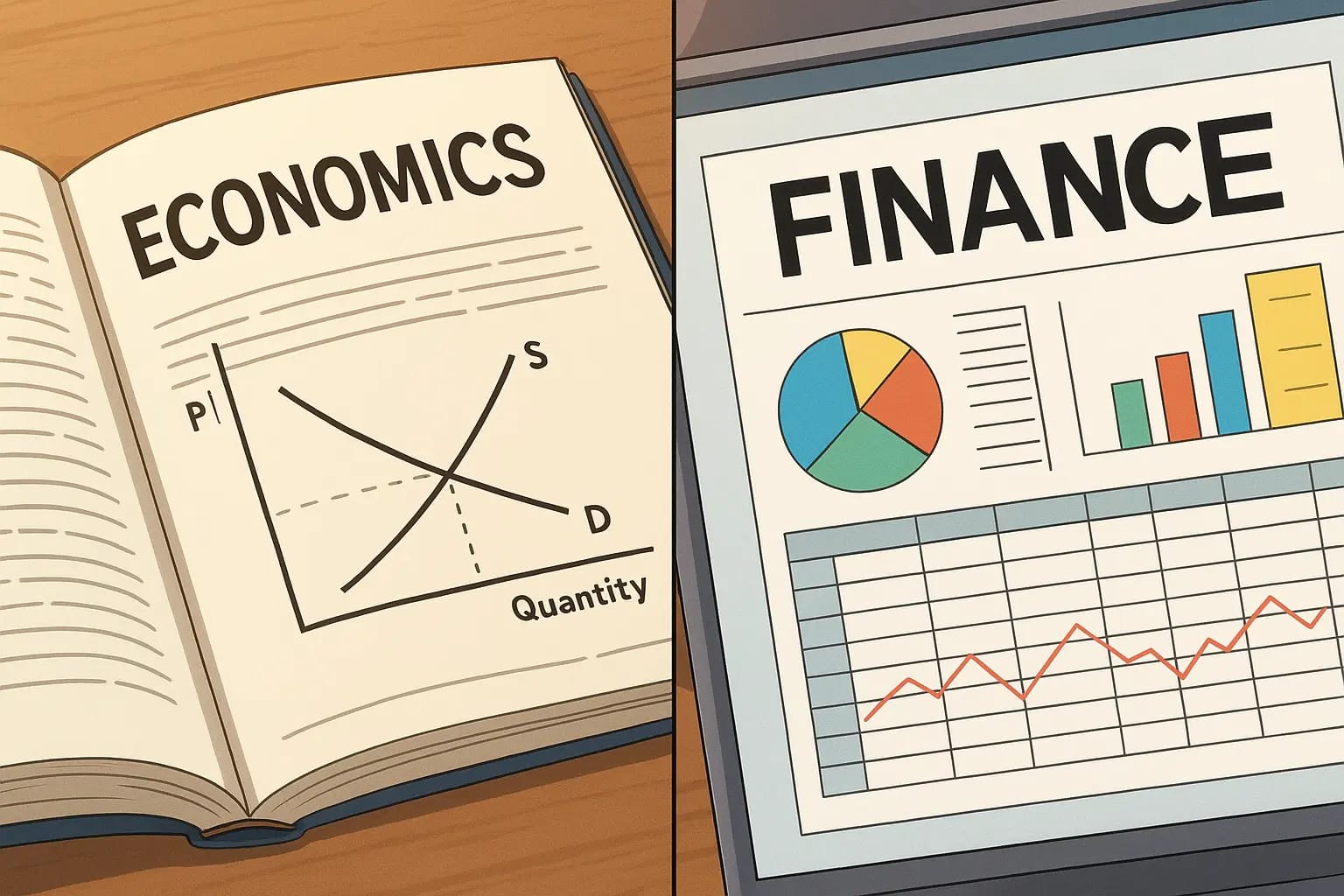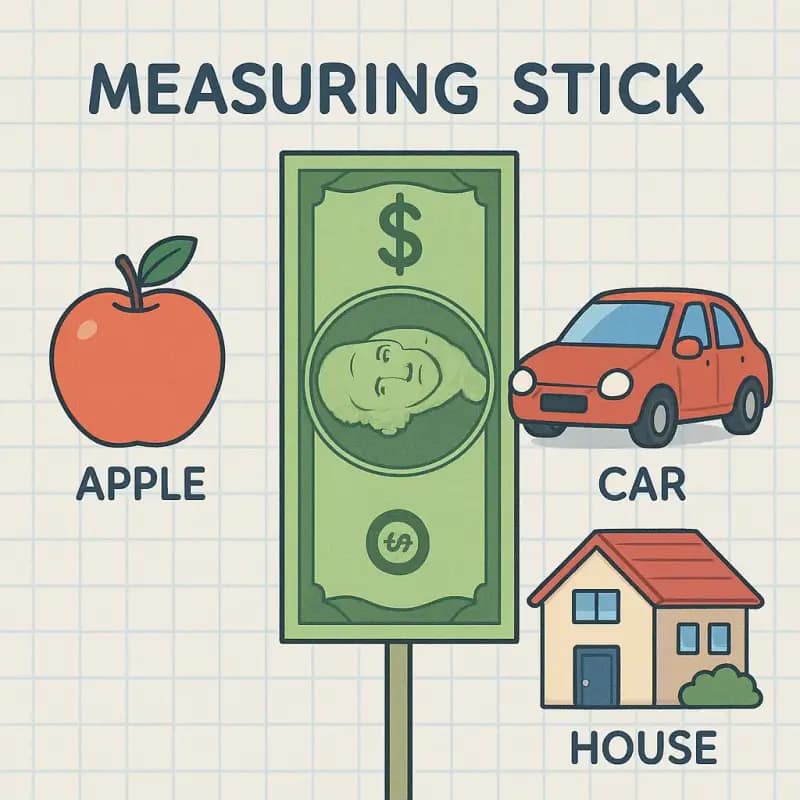The moment a youthful intellect approaches the gateway of advanced education is a time filled with immense potential. As the fields of economics and finance call out, a frequent inquiry emerges, often murmured in thoughtful contemplation: should one embark on an economics degree or a finance degree?
This decision transcends a simple selection between two scholarly routes; it represents a crucial choice that will influence one’s cognitive perspective and career trajectory. Although they might appear similar to those unfamiliar, these two areas of study are, in reality, significantly different, each providing its own perspective and equipping graduates for distinctly varied professional paths.
A Crossroads of Ambition: The Human Equation
This pivotal choice signifies a turning point of ambition, where a learner’s passions and goals converge with a particular area of study. A student’s innate inquisitiveness—be it a wish to grasp the complex interplay of international economies or an enthusiasm for the hands-on, concrete tasks of overseeing finances—acts as a guiding beacon. Recognizing these differences is vital for anyone aiming to make a well-informed choice regarding their educational and professional paths.
This selection isn’t merely about picking a lone career route. Instead, it’s about a deep connection between one’s perspective and passions with a field’s essential beliefs. Surely, the choice becomes a deeply personal matter. It’s shaped by what a student is good at, what excites them, and what they envision for their future.
Moreover, it’s the human factor that changes an ordinary educational decision into a remarkable journey of finding oneself. Can you imagine? It’s not just about jobs; it’s about discovering who you really are! The alignment of interests and values plays a crucial role. It’s all about mixing your abilities with what you love! In addition, the process feels intense and trans-formative.
Students should think carefully! They need to reflect on their desires and aspirations, because this journey is uniquely theirs. Therefore, a simple choice can lead to profound realizations. It’s amazing how one decision can spark a new path.
Ultimately, this choice is more than meets the eye. It’s an adventure in understanding, exploration, and growth. So, dive in, explore, and let your passions guide you. Keep in mind, the journey is what makes it all worthwhile. In conclusion, embrace this opportunity. Discover yourself while choosing your future.
A Tale of Two Disciplines: The Intellectual Divide
At their core, the difference between an economics degree and a finance degree is one of intellectual purpose: the why versus the how. Economics is a broad-based social science, concerned with understanding the fundamental systems, policies, and human behaviors that drive economies. It is a field of grand theories and deep analysis, exploring how resources are produced, consumed, and distributed on a societal scale. It is not merely about money; it is about human behavior, societal function, and the flow of goods and services.
Finance, by contrast, is a hands-on, practical discipline focused on the how—the direct management and allocation of financial resources to achieve specific, measurable outcomes. It is a specialized, technical field that operates within the economic systems that economists seek to understand. Finance is the art of navigating an uncertain environment to manage investments, mitigate risk, and create wealth.
Economics: The Broad View of the World
An economics education provides a broad view, exploring issues like inflation, unemployment, and global trade. It teaches students to think on a macro scale, analyzing how government policies or unforeseen events impact entire nations and global markets. It is a discipline that prizes critical thinking and the ability to break down complex problems.
This intellectual approach is famously captured by economist Thomas Sowell:
“It is one thing to know the basic principles of economics. It is another to apply them to the problems of the real world.”
This quote highlights the very essence of applied economics, which seeks to use economic frameworks and data to propose solutions to practical, real-world problems. It is a discipline that analyzes incentives, constraints, and unintended consequences, ensuring that decisions are based on a thorough consideration of long-term effects rather than just immediate outcomes.
Finance: The Focused Art of Wealth Creation
In contrast, finance is a more specialized, technical branch. It narrows its focus to the specific workings of financial markets, asset valuation, and risk management. Its purpose is to provide the tools and frameworks for investment strategy and corporate financial planning, ensuring that financial markets function efficiently and contribute to wealth creation.
The guiding philosophy of finance is eloquently described by Nobel laureate Robert C. Merton:
“The most important function of financial economics is the allocation of resources in an uncertain environment.”
This approach is reflected in its high-stakes, direct, and measurable impacts on financial performance. The intellectual difference between these two fields is not a matter of one being inherently superior, but of fundamental purpose: one is to understand the world on a large scale, while the other is to manage money within that world to create prosperity.
Curriculum & Rigor: Dissecting the Academic Experience
The academic journey in each field is a reflection of its intellectual philosophy. Both degrees demand a high level of quantitative skill, including mathematics, statistics, and data analysis. However, the application and depth of this training vary significantly.
The Economics Curriculum: Cultivating a Critical Mindset
An economics degree program is designed to train the mind to think logically and critically. The curriculum typically includes foundational courses like Principles of Microeconomics and Macroeconomics, Econometrics, and Economic Theory.
While the coursework itself is rigorous, the true value lies not in the content but in the intellectual skills it cultivates. The field encourages a “way of thinking” that requires a critical eye and a rigorous method of logical reasoning. Students learn to build abstract models and think within their constraints, which is a valuable skill for understanding new business models, industries, and strategies. This approach trains the mind to connect complex relationships and find new ones to explore.
A compelling observation from industry experts suggests that an economics degree is “tougher intellectually” and will teach a student “how to think”. This perspective highlights the discipline’s reliance on critical thinking and calculus, contrasting it with undergraduate finance, which is sometimes perceived as a more technical, formula-based major that can be navigated through memorization.
This difference in intellectual challenge is a key factor for students to consider. The value of an economics degree lies in the development of a versatile problem-solving framework, which prepares individuals for a wide array of graduate programs and specialized roles that demand abstract and conceptual thinking.
The Finance Curriculum: Building a Technical Toolkit
A finance degree, on the other hand, is built around building a practical and technical toolkit for the financial world. The curriculum typically includes courses in Financial Accounting, Corporate Finance, Investment Analysis, and Risk Management. The focus is on practical applications that can be directly applied in a business environment.
The rigor in finance lies in its precision and direct application. Students learn to use mathematical models and tools for financial analysis and modeling, assessing company performance and making data-driven decisions. A substantial portion of the learning process involves applying theoretical concepts to real-world business situations through detailed case studies. For example, students analyze dilemmas faced by major corporations and industries, such as how to value a company like Beyond Meat or whether to invest in a distressed bank.
This approach prepares graduates for the high-stakes, direct-impact nature of the profession, where complex, real-world scenarios are the norm. The most challenging aspects are not the abstract theories but the tangible, high-pressure environments where technical accuracy is paramount.
| Core Curricula and Skill Sets | Economics | Finance |
| Key Courses | Principles of Micro/Macroeconomics, Econometrics, Economic Theory, International Economics, Quantitative Methods | Financial Accounting, Corporate Finance, Investment Analysis, Risk Management, Financial Markets and Institutions, Portfolio Management |
| Core Intellectual Skills | Analytical Thinking, Critical Problem-Solving, Quantitative Analysis, Policy Analysis, Big-Picture Thinking | Financial Modeling, Investment Analysis, Risk Assessment, Financial Planning, Corporate Financial Management, Strategic Decision-Making |
| Philosophical Approach | Theoretical and Broad-Based, focused on societal systems and human behavior | Practical and Specialized, focused on managing money and assets |
Career Paths: A Look at the Destination
The degree a student chooses serves as a powerful determinant of their professional destination. While some careers overlap, the most common paths for each discipline reflect their distinct philosophical approaches.
The Versatility of an Economics Degree
An economics degree is often described as a “stepping stone” to a wide range of careers. It provides a powerful foundation of logical and analytical skills that can be applied across diverse sectors, including government, law, medicine, and consulting. Graduates with this degree often find roles in the financial world, marketing, and consulting.
For example, a Duke University graduate now works as a Senior Data Scientist, while another serves as the Vice President of Finance and Business Unit CFO at a major healthcare technology company, highlighting how their training in critical analytics is a key requirement for senior leadership.
A Canisius University alumnus, who is now an Economic Consultant, used his skills in econometrics and programming to author a senior thesis that was later published in an academic journal. The stories of these graduates are not about following a single career ladder, but about using their versatile problem-solving framework to pivot into a variety of roles.
An economics degree provides a versatile background for an array of graduate studies, including law and MBA programs.
The Direct Path of a Finance Degree
A finance degree, in contrast, offers a more specialized and direct path to careers centered on managing money, investments, and risk. Common and highly sought-after roles for finance graduates include Financial Manager, Financial Analyst, Investment Banker, and Portfolio Manager. These roles are in high demand and are often associated with high compensation due to their direct, measurable impact on financial performance and wealth creation.
The professional narrative of a finance graduate is one of direct, high-stakes performance and corporate victory. Case studies from firms like PwC illustrate this perfectly, showcasing their role in high-stakes M&A deals, such as advising on a major acquisition for KFC Asia or supporting one of the largest private investments in the UK battery storage market.
Similarly, a Yale case study explores the high-risk, high-reward decision of an investor purchasing a significant stake in the Bank of Ireland during a period of financial distress. These narratives underscore the high-stakes nature of the finance profession, where success is directly tied to a professional’s ability to allocate resources and manage risk in a turbulent world.
| The E‑E-A‑T of Careers: Economics vs. Finance | |||
| Occupation | Typical Entry-Level Education | Median Annual Wage (2024) | Projected Job Growth (2024–34) |
| Economics-Related | |||
| Economist | Master’s degree | $115,440 | 1% |
| Actuary | Bachelor’s degree | $125,770 | 22% |
| Data Scientist | Bachelor’s degree | $112,590 | 3% (Social scientists & related) |
| Management Analyst | Bachelor’s degree | $101,190 | 11% |
| Finance-Related | |||
| Financial Manager | Bachelor’s + 5 yrs experience | $161,700 | 15% |
| Financial Analyst | Bachelor’s degree | $101,910 | 6% |
| Personal Financial Advisor | Bachelor’s degree | $102,140 | 17% |
Making the Right Choice: A Personal Compass
Choosing a degree is a deeply personal decision that should be guided by a student’s individual interests and career aspirations.
Choose Economics If…
● There is a genuine fascination with the big-picture forces that shape economies and societies.
● The goal is to influence policy, conduct research, or pursue a career in government or academia.
● An intellectual preference for abstract theory, critical thinking, and complex problem-solving over rote memorization is present.
● A versatile, adaptable skill set that can serve as a foundation for a diverse range of careers, including law or an MBA, is desired.
● The idea of using data to understand and solve broad societal problems is compelling.
Choose Finance If…
● A passion for financial markets, investments, and corporate strategy is a driving force.
● A preference exists for direct, measurable impact and a clear, specialized career ladder.
● There is a comfort with high-stakes decision-making and a desire to manage money and financial assets.
● The goal is to work in a high-demand industry like banking, wealth management, or corporate finance.
● A hands-on, technical curriculum that directly prepares one for a specific, high-paying career is appealing.
The Power of Convergence
Ultimately, the most successful professionals often master elements of both fields.The Black-Scholes model, a groundbreaking formula for valuing options, was developed by economists and is now a cornerstone of modern finance.
This example demonstrates that the most innovative and impactful work often occurs at the intersection of these two disciplines. The decision is not about an “either/or” choice, but a recognition that each field provides a unique lens for viewing the world.
The truly powerful combination lies in understanding the broad economic forces that shape the world while possessing the technical skill to navigate and optimize financial systems within it.
Frequently Asked Questions (FAQs)
Q. What is the main difference between a finance degree and an economics degree?
Ans:A finance degree focuses on the practical management of money, investments, and financial assets, emphasizing specialized, hands-on skills. Conversely, an economics degree is a broader, more theoretical social science that explores how economies function, how resources are allocated, and how policies affect societies on a large scale. The core distinction is that finance is concerned with managing wealth, while economics is concerned with understanding the systems that produce, distribute, and consume it.
Q. Is a finance degree harder than an economics degree?
Ans: The difficulty of each degree is subjective and depends on an individual’s strengths and interests. Some find finance more difficult due to its heavy reliance on technical financial analysis and mathematical modeling. Others consider economics more intellectually demanding because it requires a deeper understanding of abstract concepts, complex theories, and a high level of critical thinking, often involving calculus. The true challenge is determined by the student’s affinity for either technical application or theoretical analysis.
Q. Which degree is better for a career in investment banking or corporate finance?
Ans: For careers in investment banking and corporate finance, a finance degree is generally considered a more direct and specialized path. Its curriculum is specifically designed to teach the financial analysis, portfolio management, and corporate strategy skills required for these roles. While an economics degree provides a strong foundation in critical thinking and quantitative analysis, a finance degree often offers a more focused and targeted approach to these specific, high-demand professions.
Q. What are the typical career paths for someone with an economics degree?
Ans: An economics degree opens doors to a wide range of careers due to its focus on versatile skills in analysis and problem-solving. Typical paths include roles in government (as an economist or policy analyst), consulting (at firms like McKinsey or Boston Consulting Group), research, and data science. Many economics graduates also use their degree as a foundation for advanced studies in law, business (MBA), or a PhD in economics.
Q. Do you need a master’s degree to be successful with either degree?
Ans: For many entry-level finance roles, a bachelor’s degree is sufficient. However, a master’s degree in finance or an MBA can accelerate career progression, especially for leadership positions like Financial Manager, which typically requires a bachelor’s degree and at least five years of experience. For a career as a professional economist, a master’s degree is the typical entry-level education, while a Ph.D. is often required for academic and research-oriented roles.
Conclusion: A Decision that Shapes Your Legacy
The choice between an economics degree and a finance degree is not a simple one, and it should never be reduced to a quick comparison of salary or job growth. It is a decision that shapes not only one’s career but also one’s legacy. One path offers the intellectual rigor to understand the grand tapestry of human behavior and global systems, while the other provides the technical mastery to navigate the intricate and high-stakes world of financial markets.
The truly compelling decision is to consider which of these two worldviews speaks to you on a deeper, more personal level. Whether you aspire to advise governments on policy, manage a multi-billion-dollar portfolio, or build a company from the ground up, both degrees offer a powerful foundation for a prosperous future.
The data provides a map, but your ambition must serve as the compass. The first step on this journey is to begin your own exploration, asking not what the world expects of you, but what you truly wish to contribute to it.
Engage with our curated reflections on Money, Design, and Society—crafted for discerning minds. Share your perspective, and become part of a dialogue that shapes tomorrow’s world.



